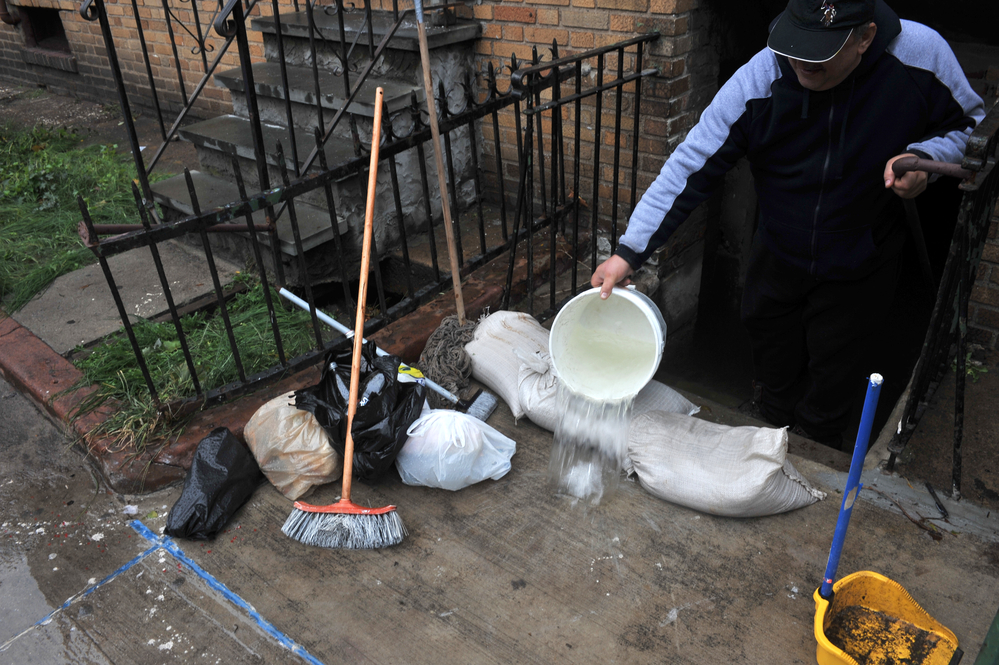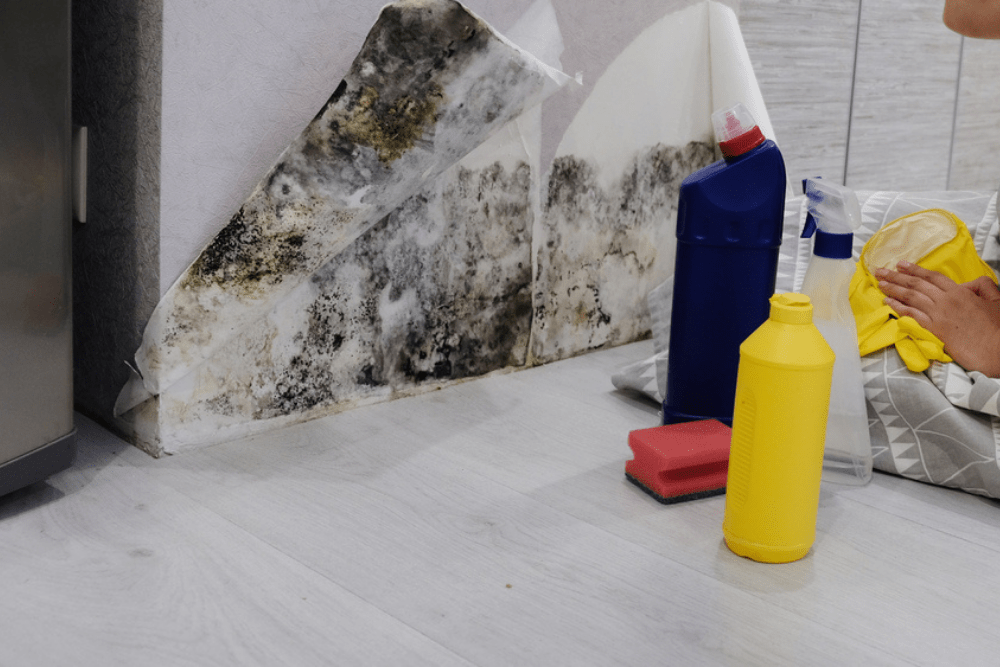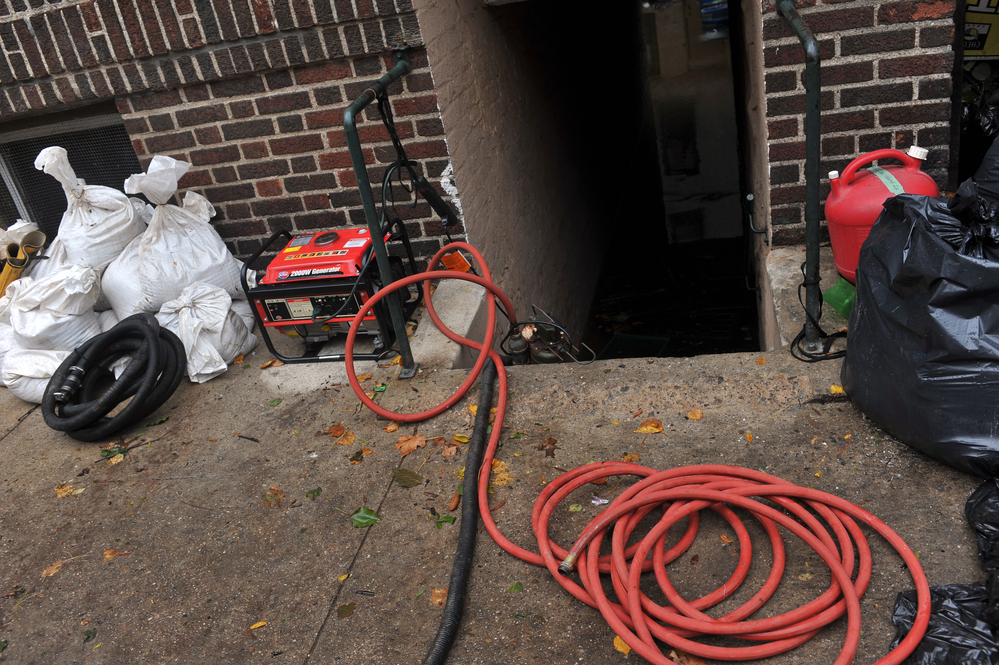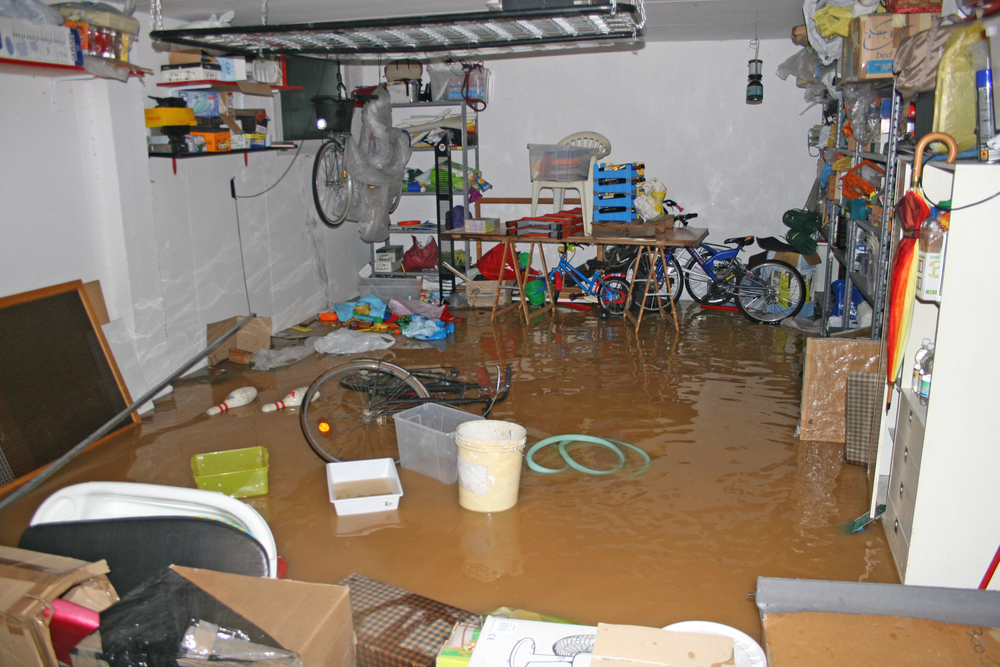We may earn revenue from the products available on this page and participate in affiliate programs. Learn More ›
A flooded basement is one of the most dreaded home maintenance problems. Seeing standing water in the basement, whether it’s an inch or a foot, can bring on a sinking feeling coupled with complete overwhelm about what to do next. Fortunately, flood damage restoration companies are experienced at dealing with flooded basements since floods are the number one disaster in America, according to the National Flood Insurance Program. Whether the flood occurred due to a burst pipe, a leaking foundation, or a natural disaster, it is possible to get a flooded basement cleaned up. Valuables like books or photo albums might be damaged irreparably from the water, but flooring can be replaced, and furniture can be saved in many cases. Flooded basement cleanup requires safety precautions, patience, hard work, and often professional help—but success is possible.
Who Do You Call to Clean Up a Flooded Basement?
Depending on the severity of the flood, it might be necessary to call a few different professionals to stop the leak, make sure the basement is safe, and prevent any further damage.

Plumber
If there is only an inch or two of water in the basement, the biggest concern will be finding where the leak is and getting it repaired. This will require the help of a plumber if it’s a broken pipe or leaking water heater. A leaky foundation, windows, or low-lying entry point near a water source will require construction assistance to repair and prevent future flooding.
Electrician
An electrician might not be the first person homeowners think of for flooded basement repair. However, if the water has risen enough to reach electrical wiring or outlets, it’s critical to call an electrician to assess and repair the damage. Homeowners will need to turn off the power before entering the water to avoid the risk of an electrical shock. Electrical outlets and wiring that have been exposed to water will probably need to be replaced or repaired. An electrician will survey the damage and make any necessary repairs. If the water has snuffed out any pilot lights on appliances, it’s also advisable to call the gas company to turn off the gas supply right away.
Water Damage Restoration Service
If there is significant water damage to any carpets or walls from water that’s been sitting for an extended period, contracting one of the best water damage restoration services (such as ServiceMaster Restore or ServPro) is the best option. Basement flooding repair can include the need for unexpected services such as mold remediation and minor construction. A water damage restoration service can help remove the water and repair any damage since they are experienced with flooded basement cleanup. While surveying the damage and trying to remove the water can be overwhelming, leaving it to a pro alleviates the stress and strain of doing a difficult job. It can be especially taxing since it can involve dealing with ruined items that have sentimental value.
Home Waterproofing Service
If a basement has flooded in a storm, chances are that it will flood again. Homeowners with basements that have flooded on more than one occasion may want to look into the best basement waterproofing companies like B-Dry or Basement Systems.
Cost of Flooded Basement Cleanup
It doesn’t take long for damage to become irreparable after a basement flood, making water cleanup a frustrating and costly expense. Homeowners can expect to pay for the cost of water damage cleanup plus any repairs. On average, flooded basement cleanup costs between $2,000 and $7,000 with an average of $4,000. No two flooded basements are the same, so costs will greatly depend on the type and extent of the damage.
Type of Damage
The type of water damage to a flooded basement is divided into three classifications: clean, gray, and black. Clean water damage is typically the simplest to resolve because the water is free of raw sewage or other toxic substances and the primary need is to dry out the space. The cost for clean water damage restoration is generally between $1,000 and $5,000. Gray water cleanup addresses flooding where the water is contaminated from appliances such as toilets or washing machines, and additional disinfecting treatments will be needed. The cost for gray water cleanup is a bit higher at $4,000 to $8,000. Black water cleanup is needed for severe damage from water that has been contaminated with sewage or flooding as the result of a storm or river overflow. It will typically require disposing of any items that have been exposed to the water in addition to disinfecting the space. This type of cleanup poses a risk to anyone involved in cleanup, and thus black water cleanup will cost anywhere from $10,000 to $15,000.
Extent of Damage
Water damage cleanup companies use a class scale of 1 through 4 to quantify the extent of the damage. Class 1 damage is a small amount of clean water accumulation, perhaps as the result of a small appliance leak. Costs for class 1 damage repair are around $1,000 to $3,000. Class 2 damage may involve water coming into contact with carpet or other absorbent materials, and it will cost around $3,500 to $6,000 to restore. Water from a class 3 flood may cover the entire floor of the basement, damage from which can cost between $4,000 and $8,000 to repair. Class 4 is the most severe—most or all belongings in the basement as well as floors and walls will likely be affected. Class 4 damage will cost between $10,000 and $15,000 to repair.
Causes of a Flooded Basement

There are several reasons a basement could flood. Most commonly, older homes tend to have a higher risk of flooding if they have older pipes, and homes near natural water sources are also at risk when there is heavy rainfall. The following are several common causes for flooding in basements.
- Heavy rainfall or rapid snowmelt
- Foundation cracks
- Broken basement windows
- Poor-draining window wells
- Sewer system problems
- Sump pump problems
- Improperly sealed basement walls
- House located at the bottom of a slope
- House located near a natural water source
- Burst or leaking pipes
- Weeping tile blockage
- Overflowing rain gutters
- Improper downspout locations
- Appliance leaks
- Overflowing toilet or bathtub
- Drainage system failure
- Water heater failure
In many of these cases, proper home maintenance can help to prevent flooding problems. For instance, keeping rain gutters free of debris and in good repair prevents water from dripping down the walls constantly and pooling along the foundation. If the foundation isn’t sealed well, that tenacious water will find its way into a crack on the house as it searches for the lowest point. Additionally, old pipes should be updated by a qualified plumber to help prevent leaking or broken pipes due to age. For homes that sit on a slope, it’s imperative to add landscaping or drainage pits to help reroute any excess water.
Steps to Take After a Basement Flood
After the initial shock of a flooded basement has worn off, it’s time to get to work. Dangerous mold can set in after as little as 2 days on wet or damp fabric. That mold can cause a musty smell in the basement and can pose health risks that can cause long-term challenges. If the thought of tackling a flood restoration is too much to handle, or if the homeowner is not physically capable of doing the work, a water damage restoration company can help get the basement back to its usual state. There are several steps for homeowners and pros to follow after a basement is flooded.

- Safety first: Assess how deep the water is before getting in. If the water has reached any outlets or electrical wiring, homeowners will need to turn off all electrical power to the house before entering the water. This reduces the risk of a dangerous electrical shock. If the water could have put out the pilot lights to some appliances, then the homeowner will need to call the gas company to shut off the gas supply.
- Locate the leak. Next, the homeowner will need to identify the source of the leak. It could be a forgotten bathtub that’s overflowing, a blocked toilet that’s continuously flowing, a broken washer or water heater, or a window leaking after heavy rain. If the leak is from heavy rains and flooding, the homeowner will need to wait until the storm has passed before beginning the cleanup process.
- Call a pro. If the homeowner can’t identify the leak, they’ll need to call a plumber or a disaster restoration company who will know how to locate the problem. The cleanup company can also get right to work on cleaning up the mess.
- Call the insurance company. The homeowner will want to alert their insurance company to the type of flooding they’re experiencing, and if they have flood insurance, they’ll want to find out what it covers and what the homeowner will be liable for.
- Pump out the water. Homeowners can use a pool pump or wet vacuum, or rent a gas-powered water pump, to pull out all the excess water in the basement.
- Dehumidify the area. The extra water in the enclosed area will increase the overall humidity. Getting rid of that excess moisture is critical for drying out the space before mold begins to grow. Homeowners can use fans or bring in a dehumidifier to speed up the process.
- Remove all porous materials. Porous materials include rugs, carpets, books, clothing, furniture, and even drywall if the damage is significant. Drywall can grow mold on the inside if it’s been exposed to water too long.
- Throw away contaminated items. If the basement is flooded with raw sewage or floodwaters, the items located in the basement are highly likely to be contaminated with harmful bacteria. Some things can’t be salvaged. If the flood wasn’t contaminated, items that smell mildewy might be saved if they’re taken to a professional cleaner. It is possible to save some furniture depending on the damage and whether it can dry within a couple of days. Homeowners will want to throw away any soaked cardboard boxes, as they don’t dry well.
- Wash any walls or floors that were flooded. Even if the flood involved clean water, it’s still a good idea for homeowners to sanitize and deodorize any area that was flooded.
- Repair any broken pipes or foundation. Whatever caused the leak needs to be repaired by a professional. It’s essential for basement walls to be waterproofed and for the foundation to be sealed properly.
- Replace flooring or walls. If the homeowner needs to tear up flooring of any kind, they’ll want to replace it along with any damaged walls.
DIY vs. Hiring a Professional for Flooded Basement Cleanup
Basement flood cleanup is an unexpected and expensive cost that any homeowner dreads dealing with. It’s understandable that many homeowners research “what to do when your basement floods” and follow the steps themselves. However, it can be a difficult and even dangerous process, so homeowners will want to get all the power and gas turned off before attempting any DIY cleanup. Most of all, DIY flood cleanup can be emotionally draining for the homeowner, as valuables and sentimental items may have been destroyed. The better option is to use a water damage cleanup company to make the process easier and ensure belongings have the best chance of being restored.

These companies are qualified to locate leaks of all kinds and won’t hesitate to get right into a mess of floodwaters. They’re also the best option to call after a raw sewage leak since they have all the safety equipment necessary to work in a toxic environment. They will be able to quickly and efficiently get the water out of the basement and assess which valuables can be salvaged. They also have the right experience to evaluate whether any drywall or hardwood floors will need to be removed and will know how to dry a wet basement sufficiently to avoid mold growth.
No matter what, the most important step is to start getting any important items out of the basement as soon as possible. The sooner they start drying out, the better the chance of preventing mold.
How to Find a Reputable Professional
It may be difficult to do due diligence researching the best flooded basement cleanup company in the midst of an emergency. It’s worth homeowners doing some research ahead of time so they have the numbers to call in case of a flood on an easily accessible list. Most importantly, the company should be licensed to do business in the area, insured, and have any necessary certifications for dealing with toxic waste. Before hiring a plumber or electrician, homeowners will want to make sure the company is licensed, insured, and certified. In all cases, homeowners will want to check that the companies have been in business for a while to know that they are experienced in flooded basement cleanup. Before googling “basement flooding repair near me” homeowners can have a list of relevant questions handy.

For water damage restoration:
- Ask for references.
- Check with friends and neighbors who might have hired a water damage restoration service recently.
- Check online reviews.
- See if the company offers 24/7 assistance.
- Get a detailed estimate and timeline.
- Call more than one company for a quote.
- Ask about the company’s pack-out process for damaged and undamaged items. (They should create a detailed inventory list with damage notes.)
- Ask if the company can assist with an insurance claim.
- Avoid scammers: If a company requests payment up front, seems too cheap, or shows up after a natural disaster without asking, keep shopping.
- Check if the company is listed on the Institute of Inspection Cleaning and Restoration Certification website. (Most licensed companies will be.)
For plumbers:
- Ask for references.
- Check with friends and neighbors who might have hired a plumber recently.
- Check online reviews.
- See if the company offers 24/7 assistance.
- Get a detailed estimate and timeline.
- Make sure to ask for a master plumber or journeyman qualified to work on plumbing problems that are more serious than just a clogged pipe.
- Call more than one company for a quote.
- Ask how quickly they can come or if they have to wait until the water level is lower.
- Ask if they expect any serious construction work will be required to repair the problem. (This could be the case if it’s a problem with the main line.)
For electricians:
- Ask for references.
- Check with friends and neighbors who might have hired an electrician recently.
- Check online reviews.
- See if the company offers 24/7 assistance.
- Get a detailed estimate and timeline.
- Call more than one company for a quote.
- Ask how quickly they can come or if they have to wait until the water level is lower.
- Ask whether the electrician has vocational training.
- Ask if they have experience with water damage service.
If the home is located in an apartment complex, the leasing office may need to be contacted first to coordinate with a plumber, electrician, or restoration company that they’re familiar with. It’s possible that other units also experienced flooding, so they might be responsible for repairing the damage to all units at once. It’s also a good idea to get in touch with insurance ahead of time to check on coverage for flooding. Many homeowners insurance policies cover water damage that is sudden or accidental. Similarly, many renters insurance policies cover water damage that is the result of a burst pipe or accidental overflow. A home warranty will not cover water damage, but if faulty plumbing was the culprit, homeowners can check whether their plan will cover repairs to the plumbing system itself.
Investing in Basement Waterproofing
Basements are inherently at risk of taking on water since they’re the lowest point of a house. When they’re built, builders take precautions to prevent leaks, but over time, homes can settle, the ground can shift, sinkholes can appear, and water can pool around the foundation. Most basement walls should be waterproofed at the time of construction, but water can still seep in and create a humid environment.

Homeowners can hire a foundation contractor to come in and waterproof basement walls and reseal the foundation if there are any traces of water on basement walls or along the edges of doors or windows. Window wells are another common source of leaks if the drainage system isn’t sufficient to keep water away from the edge of the windows. Basement waterproofing costs between $2,250 and $7,063, with most homeowners paying an average of $4,539. Having a contractor seal and waterproof the basement is a good investment against some less obvious leaks that happen over time. While it may be a large cost up front, it is preferable to the stress and huge price tag that come with a flooded basement. A professional can also give homeowners some tips for waterproofing basement walls to help protect their home from future water damage. This is also key since many insurance policies won’t cover ground seepage that causes basement flooding.
How to Prevent Future Basement Flooding
A flood in the basement is a major stressor that more often than not requires costly repairs. Luckily, there are a few preventative measures homeowners can take to reduce the likelihood of basement flooding.
Keep Gutters Clear
It may seem obvious, but gutters that are clogged cannot effectively direct water away from the home. Instead, that water can accumulate around the home’s foundation and eventually leak into the basement. Be sure to clear gutters regularly or hire one of the best gutter cleaning services to stay on top of gutter maintenance.
Reslope the Ground
The ground surrounding a home’s foundation should slope down and away from the home so that water won’t collect by the foundation. Make sure that there is a slope of at least 6 inches around the perimeter of the foundation for at least 10 feet.
Seal Gaps and Cracks
A small leak in basement walls or ceilings can turn into a flooded basement given enough time. Simply sealing small cracks with caulk should block water from leaking in, but larger cracks should be sealed professionally to prevent further issues. It may be necessary to have the basement waterproofed if there are additional leaks. Water coming from above could be caused by faulty plumbing, so if the issue persists more research might be necessary to determine who to call for a water leak in the ceiling.
Install a Sump Pump
Homeowners who have researched how to prevent basement flooding during heavy rain have probably considered installing a sump pump. A sump pump collects water from underneath the basement floor and pumps it out before the water level gets too high and overflows into the basement. The best basement waterproofing companies or plumbers can install a sump pump if the home does not already have one, or a backup sump pump if needed.
FAQs
Still wondering about flooded basement cleanup? Check out the answers to these frequently asked questions.
Q. How much does it cost to clean up a flooded basement?
It depends on the severity of the flood and the level of contamination. The average range is between $2,000 and $7,000. A simple flood that is only a few inches deep could cost an average of $4,000 to clean up. Extensive floods with contaminated ground or wastewater can exceed $7,000 to clean up.
Q. How long does it take for a basement to dry out completely?
Some of this depends on how saturated the basement was and how well the homeowner or water damage restoration company facilitates the drying-out process. Using a dehumidifier and fans, and making sure the area is well ventilated, can dry out the area faster. Mold can grow within 2 days, so it’s important to get started on drying out the basement quickly. It’s not uncommon for it to take a few days to get the basement fully dried out, especially if the water was deep.
Q. How do I clean up my flooded basement?
Homeowners will first need to safely turn off gas and power, then remove the water using a pump, remove porous items, decrease moisture using fans, sanitize and deodorize, and replace any damaged materials and repair any leaks. Water damage restoration companies specialize in this type of work, so calling them in to take care of the flooded basement may be the best option; especially if the basement is flooded with gray or black water
Q. Does homeowners insurance cover flooded basement cleanup?
It depends on the cause of the flooding. Policies differ from one house and region to the next, so homeowners will need to speak to their agent to know exactly what will be covered under their plan. Standard home insurance may cover flooding from a broken appliance, overflowing bathtub, and sometimes even frozen pipes that burst, as long as the homeowner was not negligent. Homeowners who live in high-risk flood areas can work with their insurance company to find the best flood insurance policies to help protect them. If the home is located in an area prone to flooding or is near a water source, the homeowner will want to ask about the cost of flood insurance and how to add this coverage before disaster strikes.
Sources: Fixr

